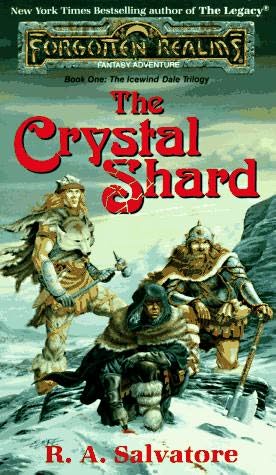Drizzt Gains a Level!

The Crystal Shard
The Icewind Dale Trilogy, Book I
R.A. Salvatore
TSR Publications, 1988
-5
Scale (-12:12)
Is poking fun at a "Forgotten Realms" book shooting fish in a barrel? Is it beneath Elfstar Industries? Maybe it is, maybe it is. But. At the same time. Look at that picture of the cover. This is a New York Times bestselling author. Maybe someone has to take a closer peek. And maybe that person is Elfstar Industries.
Now, the backstory: I loved this book when I was in high school. That was around when it was published. Now, I do not love this book. This book came out of a box that was well-hidden in my mom's attic. It came home to my house when my mom made me get all my crap out of said attic (awww, mah, do I have to?) with plenty of other lousy books, all of which I had no intention of re/reading. But then my housemate--it was his week to be the evil one--pulled it out of a box and decided it was time. So I got to read it too.
By the "about the author" page, Monsieur Salvatore was a humble CS major in college until he recieved the Lord of the Rings trilogy as a "Christman" [sic] gift, at which point he changed his major to journalism. You can tell by the writing. Not by the quality of the writing, mind, but by some of the place names he decides on. Such as the crystal tower "Cryshal Tirith," no relation to Minas Tirith at all.
The Crystal Shard, in many ways, is not actually related to the Lord of the Rings, however. It is more the spiritual successor of books such as the Conan series, the Gor series, and some of Edgar Rice Burrough's lesser-known works, especially the Pellucidar books. There's a good possibility that this is because Salvatore is writing in a "shared universe," in this case the Forgotten Realms. Please note how this last link owes a lot to the movie versions of Lord of the Rings.
Salvatore might not be a bad writer. I think he is, mind you, but he might not be. When you're writing in one of these, you're excessively limited. The best example of this that I can think of is Janet Kagan's book "Uhuru's Song." Obviously enough, it's a Star Trek novel. Her other two books, "Mirabile" and "Hellspark," are fantastic SF reads, and you should go get them. "Uhuru's Song," well, it's a, well, Star Trek novel. Even good writers suffer when writing in shared universes.
Anyway. "The Crystal Shard" follows the adventures of the Manly Wulfgar, the barbarian about-to-be-king, the Dwarfly Bruenor, son of the uncle of the cousin of the Lord of the Lost Mithril Hall, the Elfly
There are constant themes running through the text. Drizzt, the Drow (Dark Elf), is a Good Guy. He Likes people. Yet, people are prejudiced against him, often not believing what he says. Why, we should take a lesson from this, right? Prejudice is bad! Except. People don't believe Drizzt because, in this particular shared universe, Dark Elves are bastards. I mean, really, they're Dark Elves. Their name has a capital-Dark in it! A favorite D & bloody-well D adventure is to go lay the smackdown on Dark Elves! They're jerks! Cutthroats! Even Salvatore, in one line in the text, says that Drizzt is the only good one. So, duh, yeah, people are prejudiced against him. It's like if you met a member of the Bush family, and he was all sortsa generous with charities, you wouldn't buy it right off the bat, cause he's a Bush! So, the point here is that as far as social value goes, this book is crap.
There are some other problems. Even in most BEM SF people don't really use the word "monster" too often. Salvatore throws it around like it's going out of style. [Ed. Note: It has gone out of style.] The language is far more stilted than necessary; it occasionally feels like one of those Uncle Sams on Stilts that show up at parades in movies. (Has anyone ever seen one of those in person? I haven't.)
The book moves too quickly. Three pages to deal with a dragon. Two pages to deal with a demon. Two pages to make the greatest warhammer the world has ever seen. One page to beat down a barbarian king. You get the point.
And then there's the coincedental nature of the whole thing. The dragon (three pages) just happens to have in his horde an anti-demon scimitar, which is the type of weapon that Drizzt just happens to use, and there just happens to be a demon (two pages) on its way. It's all just so very... easy. Too easy. Even when he makes it seem difficult, you know everyone is going to survive.
This book sucks. I hate to put it into these terms, but it just does. I whimpered a few times, and never laughed once. But before I go, I'd like to end this review with my least favorite line from the book: "Drizzt seemed able to weigh every move he ever made in the scales of high adventure and indisputable morals." What kind of scales are those? Someone draw me a picture please?

0 Comments:
Post a Comment
<< Home